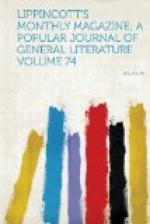“Not for a thousand. In! in!”
“Come, now, Duhaut, this is all humbug. You know I’m not penitent, and I’ll be—— if I’ll confess to you.”
Without more words, the burly priest seized the recalcitrant and grabbed him by the neck, trying to force him into the confession-box. Pierre resisted, and, as the cure told us bursting with laughter, the two wrestled and waltzed half around the church. Finally Pierre was brought to his knees.
“Eh bien, allez! What am I to confess?” he grumbled.
“Every sin you have committed since your last confession.”
How malicious was Pere Duhaut in this! for he knew Pierre had not kept the observances of the Church since he left home at seventeen, and had not been an anchorite either.
“I’ll make it an even hundred,” begged the now exasperated yet humbled Pierre. “Come, now, do be reasonable; that’s a jolly old boy.”
“Confess! confess!” roared the confessor, dealing the kneeling impenitent a sounding cuff on the ear.
“Ask Pierre how he got his certificate,” roared Pere Duhaut. “Demandez-lui! Demandez-lui!”
But we never did.
Until his grave received him, only a few weeks ago, a marked character of our ville was a stooping old man, of a ghastly paleness, noted through all the region for avarice and for speaking every one of his many languages each with worse accent than the other. His Spanish sounded like German, his German had the strongest possible American accent, his English was vividly Teutonic, and after forty years of marriage his Norman wife never ceased to mock at his atrociously-mouthed French. He was wine-merchant and banker combined, and, though his social position was among the best in our bourgeoise ville, all the world smiled with the knowledge that the rich old banquier, whose nose had a strong Hebraic curve, delivered his own merchandise at night from under his long coat, in order to escape the tax on every bottle of wine transported from one domicile to another.
The stately gate-post of “Pere S——’s” pretentious and philistine mansion is decorated with the coats-of-arms of several nations. England’s is there, Germany’s, Spain’s, Portugal’s, as well as our own Eagle; while upon days when our own exiled hearts beat most proudly—4th of July and 22d of February—our star-spangled banner floats from his roof-top as well as from our own, the only two, of course, in our ville. Our ville, so important to us, has scarcely an existence for our home government, and administrative changes there float over us like clouds of heaven, without touching us in their changefulness. Thus Pere S——, though so courteous and cordial to Americans, has been long years forgotten at Washington, whence every living servitor of the administration that appointed him our consul here has long since passed away forever. He was born in Pennsylvania, of German parents, nearly eighty years ago. He received his appointment in 1837, and held it through fourteen administrations since Van Buren, without ever returning to America, till he faded away one little month ago and was buried in the parish cemetery of Saint-Leonard by a Lutheran pastor brought over for the occasion from Havre. No church-bells tolled for his death, and the street-children did not go on their way singing, as they always do, to the sound of funeral bells.




